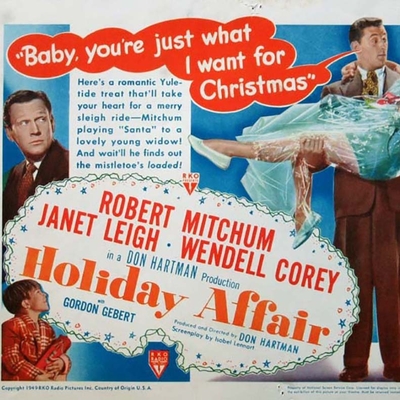On the surface Holiday Affair (1949) is a standard Christmas-in-the-big-city movie – a less mawkish Miracle on 34th Street with touches of His Girl Friday, Holiday, Bachelor Mother and Remember the Night. Making the picture was anything but regular, from the legal troubles of the leading man to the sexual harassment of his co-star by the famously eccentric and lecherous owner of the studio.
Holiday Affair was the second film Robert Mitchum made after he was released from a stint at Wayside, a prison farm in Castaic, California where he was sentenced to forty-three days after being arrested for marijuana possession during a 1948 police raid on a Hollywood party. The raid was a setup – a police sting for which Mitchum and actress Lila Leeds hadn't been tipped off.
It could have been the end of Mitchum's career except for Howard Hughes, the millionaire aviator and owner of RKO, the studio where Mitchum was under contract. He thought it would be great publicity, and immediately re-teamed Mitchum with Jane Greer, his co-star from Out of the Past (1947), in Don Siegel's The Big Steal, sending Mitchum directly to Siegel's set in Mexico upon his release from Wayside.
(Mitchum's conviction would be overturned in 1951, but the publicity killed Lila Leeds' career nearly dead; it had barely begun when she was caught up in the sting, and after serving sixty days in jail made just three more pictures, one of which was She Shoulda Said No! (1949), a quickie exploitation film in the vein of Reefer Madness. Her life is actually a fascinating story, and deserves its own movie.)
Holiday Affair begins in the (now nearly extinct) world of Manhattan's department stores at Christmas – retail empires like Macy's, Gimbels, Bloomingdale's, Wanamaker's, Bonwit Teller, Alexander's, Stern's, B. Altman, Henri Bendel, Lord & Taylor and several others made up for the film. Connie Ennis (Janet Leigh) is a comparison shopper for one of the big stores, tasked with buying items from their rivals to check on price, quality and service – the sort of job that existed in the pre-internet world.
She buys an expensive train set from Steve (Mitchum), a veteran working as holiday help in the toy department of Crowley's, who pegs her immediately as she doesn't ask any questions and pays retail price plus tax with exact cash. Connie is a war widow with a son, Timmy (Gordon Gebert), who assumes the train set is a present for him until his mother lets him down, saying that "if you wish for big things all you'll get are disappointments."
Connie has a boyfriend, Carl (Wendell Corey), an up-and-coming lawyer who's been dating her for two years; his persistence has finally worn her down and she agrees to marry him in the new year even though they both know she doesn't love him. When she returns the train set to Crowley's the next day, her clumsy lack of guile as a comparative shopper gets Steve fired. Being Robert Mitchum – what's getting fired after more than a month on a prison work farm? – he takes it in stride, even offering to take her for lunch to his favorite spot: hot dogs by the seal enclosure at the Central Park Zoo.
Like Maureen O'Hara' Doris in Miracle on 34th Street, Leigh's Connie is a woman whose disappointment and grief have made her draw up defenses against sentiment and expectations – the exact opposite of Steve, whose apparent aimlessness hides an ambition to move to California and buy into a war buddy's boat-building business. The outcome is clear from the start, and all the film has to do is distract the viewer with a string of seeming obstacles and plot on the way to its preordained ending.
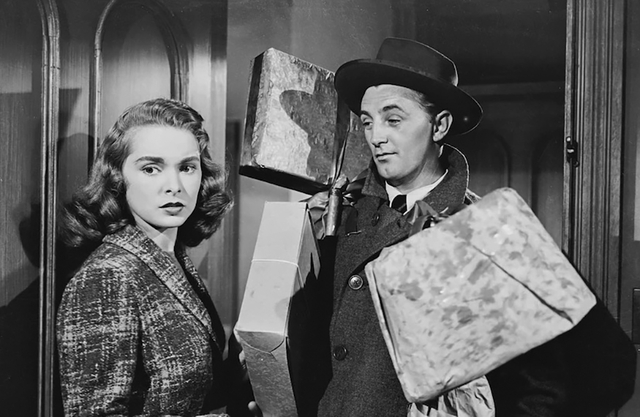
What's intriguing is that Doris and Connie were so much an obvious type that movies could be written around on the assumptions audiences were expected to have about them. This hints at unwritten chapters about career women in that anxious gulf between the end of the war and the brakes coming off the postwar economic miracle, but there's no time or space to explore that today.
Connie gets Steve to help her with her covert shopping for the rest of the afternoon, but they get separated on Fifth Avenue and Steve shows up unexpectedly at her flat while they're getting ready to go out for dinner with Carl. He's resourceful enough to worm her address out of a co-worker at Crowley's, and smart enough not to be obvious about his feelings for Connie, careful to treat Carl with friendly nonchalance while creating an instant bond with Timmy, a boy clearly longing for a father figure.
Nobody in the audience would presume that Corey's Carl stands a chance against Mitchum's Steve – especially with the actor at his most sleepy-eyed and bemused. Corey is the picture's Ralph Bellamy – the affable rival who'd be deserving of the heroine's affections if someone like Robert Mitchum or Cary Grant didn't share the universe with him.
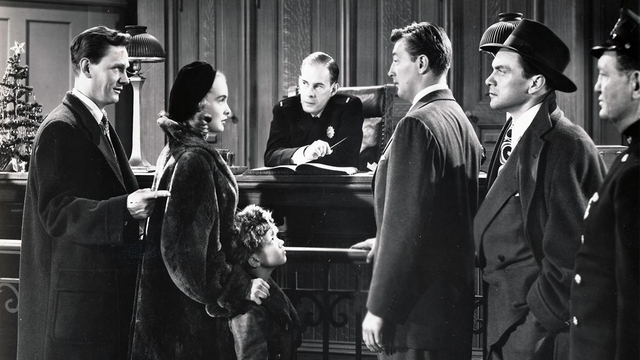
The two men remain on friendly terms when Steve announces his feelings for Connie during Christmas dinner with her parents, and Carl even offers to defend Steve when he's mistakenly arrested for mugging a man in Central Park, if only to get his rival out of jail and on a train to California as soon as possible.
Janet Leigh was signed to MGM, but on a three-picture loan to RKO after Howard Hughes had seen promo photos and set his sights on the actress – much to her distaste. After her agent had pressured her into going on a date with Hughes, she was horrified when a brief airplane flight turned into a trip to Las Vegas. She didn't respond to the millionaire's obsessive, frankly off-putting attention, especially after he set his minions to tail her, and began showing up on dates and evenings out with her parents.
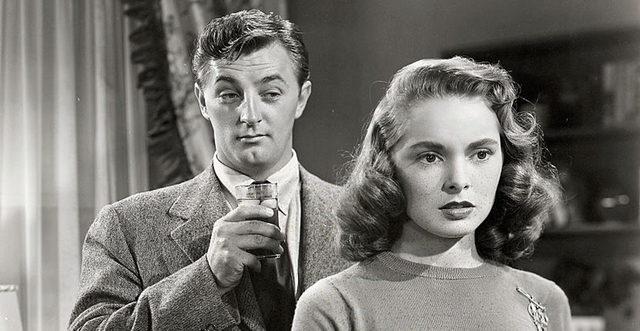
"This man has been trying to intimidate me," Leigh told an executive at MGM when they announced she'd been loaned out to Hughes. "All these things have been happening. I don't know what he has in mind for me if I go over there."
"And the man at MGM just said, 'Now, honey, we're sure there's nothing to worry about. This is a business situation, nothing more. There's no funny business. We're talking about a lot of money at stake here. So you go and do as we say.'
"And that was all they wanted to hear about that."
As for Mitchum, he felt a strange kind of loyalty to Hughes for sticking by him after his pot bust, even if he knew – like everyone else – that the man wasn't playing with a full deck. In Baby I Don't Care, his 2001 biography of the actor, Lee Server describes RKO under Hughes as "a personal, rather perverse hobby." Making movies took second place to "ferreting out leftists, elaborately seducing starlets, settling private grudges, and studying the screen tests of still more starlets."
Hughes would suddenly take an interest in a picture and begin micromanaging production, calling for re-casting and retakes. He had the studio rigged with bugs and actors and other staff tailed. Mitchum nicknamed his boss "the Thin Man" and "the Phantom."
"Aware of the rumors that Hughes had all the dressings rooms and offices bugged," Server wrote, "Mitchum would amuse onlookers by talking to the wall or under a desk – 'Did you hear what I said, Phantom, you deaf fucker? You want me to repeat it?'"
This didn't prevent Mitchum from having fun on the job, however. Leigh got a glimpse of how Mitchum would spend his days on the lot during one of her first visits to the studio:
"I had driven onto the lot at RKO. I noticed some commotion from one of the bungalow dressing rooms, and then I saw coming out of the bungalow Mr. Mitchum, playing a saxophone and leading an entourage of six or seven people behind him. Like the pied piper! And they headed down the studio street, Bob playing the sax and his entourage marching and dancing behind him, the way they do at those New Orleans funerals, where they play 'Where the Saints Go Marching In.' That was my first sight of Bob Mitchum. And it made a very vivid impression on me."
"I was pretty naïve and green then," Leigh recalled, "and the fact that he had been in jail and that he had actually smoked marijuana, wow, this sounded really exciting and dangerous."
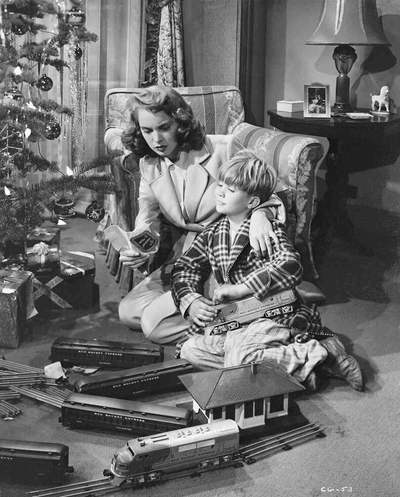
Leigh's recollection of shooting Holiday Affair is a reminder of what an actress could expect while making a movie in Hollywood until very recently. (And we can only presume that the movie business has cleaned up its act post-#MeToo if we believe the testimony of its own self-policing. I don't recommend it.)
During the Christmas dinner scene Leigh sat between Mitchum and Corey at the dinner table. "And they were so naughty," Leigh recalled, "each time while I did the scene Bob and Wendell would reach under the table and put a hand up either leg. And I didn't know what to do. I thought 'If I react to it and stop the scene going on with the other actors, I'll just look like a complete ninny.'"
"And I would tell myself, 'They aren't really going to go any farther with it,' but then I would think, 'With these two, God, maybe they will!' Oh, but they did it to unnerve me. It was so funny. And they never cracked a smile. They were both so cool."
In another scene, Steve is supposed to be leaving Connie's life forever – one of several false exits he makes in the picture – when he comes up behind her in the kitchen and plants a lingering kiss. "And I knew he did it just to catch me off balance," Leigh remembered, "and he did. I was so shocked I couldn't speak. And (director) Don Hartman liked my reaction so much they kept it in the film."
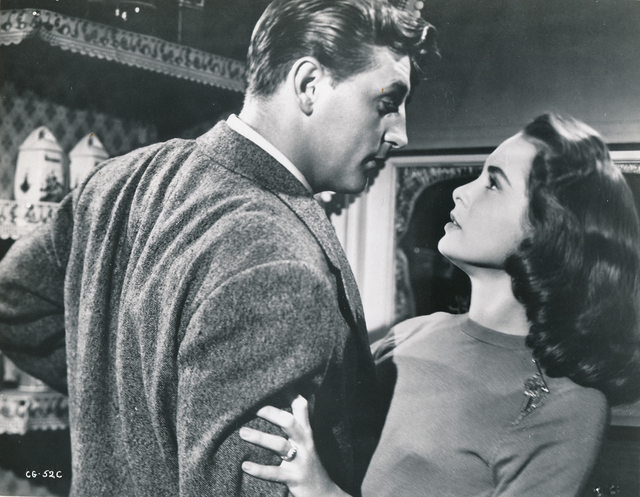
Mitchum would get the tables turned on him later that year when he made My Forbidden Past with Ava Gardner, and the actress – "a sexual adventuress" in Server's description – surprised him with the same trick. It was the start of a hot and heavy affair during filming, but out of courtesy to Hughes – one of Gardner's flames – he asked the mogul if he'd mind.
"You might as well," said Hughes. "Everyone'll think you're a fag if you don't."
Gardner, who was stringing along Frank Sinatra at the time, wanted Mitchum to leave his wife, Dorothy, and move in with her. Mitchum courteously said she'd have to ask Dorothy, who curtly said no. Server quotes Gardner recalling later in her life that every woman who starred alongside Mitchum fell in love with him. As for Mitchum, he'd "unsentimentally speak of Ava's fondness for performing an intimate act known as a 'golden shower.'"
Hughes' interference with Holiday Affair was limited to Leigh's hair and wardrobe, insisting that the actress wear a sweater in one scene so tight that it gave her bust the bullet profile that would become so popular in the coming decade. (It has to be remembered that among Hughes' many accomplishments was an avid interest in the design of women's undergarments.)
Apart from that the shoot went by without incident, and Don Hartman was able to wrap filming at the start of September and get the picture out by Thanksgiving. Several of the posters for the film showed Leigh wrapped up in cellophane like a Christmas present. Such was the standard of taste at Hughes' RKO.

Knowing all the backstory going on behind the making of Holiday Affair, it's no surprise that the film plays like such a knowing, faintly louche Christmas picture today, with none of the longing for grace and transcendence in, say, The Bishop's Wife, or the light screwball farce of Christmas in Connecticut. It's a Christmas picture for people who give their family gift cards loaded with nominal amounts of cash.
The opening credits and the final montage drop a heavy hint that it was all a mechanism – a delivery service meant to get Connie from one point to another, with Christmas as more of a test than a religious holiday. Even the setting – Manhattan the human jungle, busy with retail transactions on one hand and muggings in public parks on the other – is ultimately something to be endured and then left behind, on the way to an ending that proclaims "Go West, young man (and woman)."
As for Mitchum, he sailed through his RKO years with the same apparent indifference that he made a point of bringing to the craft of acting. Just before Christmas of 1952, when his relationship with Hughes at RKO was nearly over, he was given the Sour Apple Award for Least Cooperative Actor by the Hollywood Women's Press Club.
"Your gracious award becomes a treasured addition to a collection of inverse citations," he wrote back in a wire read at the press club luncheon. "These include several prominent mentions among the Worst Dressed Americans and a society columnist's 10 Most Desirable Males list happily published on the date I was made welcome at the county jail."
Mark Steyn Club members can let Rick know what they think by logging in and sharing in the comments below, as access to the comments section is one of many benefits that comes along with membership in the Mark Steyn Club.

